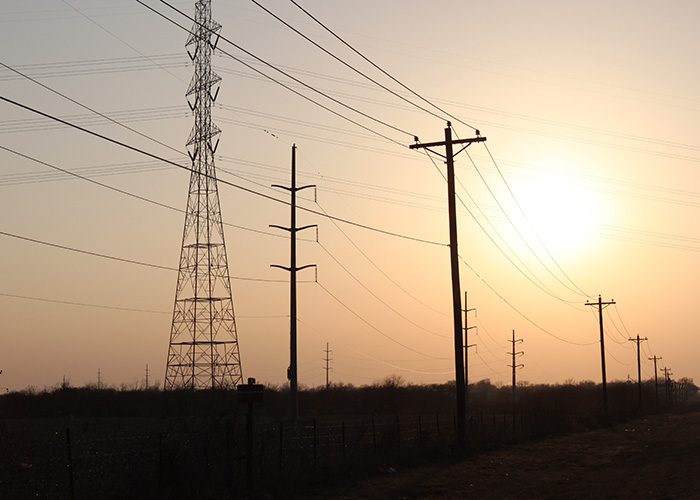Be Safe – Call 811
A Texas safety team will contact all utilities such as water, gas, and telephone that have underground lines in the area, so they can come to the location and mark the area allowing you to work safely and without worry. GVEC will come to the location and mark the area only for underground lines that are owned and operated by GVEC.If you do come in contact with an underground electric line, do not cover the hole up. Leave the area open, stay clear of the lines, and call your electric provider immediately. Texas 811 is a free service, so please follow their procedures to prevent any problems and to help save lives.

When you plan to use heavy equipment, which can reach heights within 10 feet of electric lines, state law requires that you call GVEC at least two days in advance. GVEC will explain ways to prevent contact with power lines.
- Stay clear of electrical substations. The caution signs may state “Warning-High Voltage” or “Danger-Keep Out” notifying you it is a dangerous area.
- Do not work or play near electrical substations.
- Never climb over the fencing around a substation for any reason. If you accidentally throw or drop something inside the fenced in area of a substation, notify the electric company and they will remove it for you.
- Do not plant trees or shrubs near pad-mounted transformers where they could obstruct access to the transformer and the roots could grow underneath the transformer and damage underground lines.
- Do not shoot at or throw anything at the electrical equipment on utility poles. It is illegal and can cause power outages or danger to others, especially a person on a life-support system.
- Always look up before planting trees or working at elevated locations such as roofs. Overhead power lines are not insulated and carry enough electric current to seriously injure or kill a person who comes in contact with the lines.
- Think ahead when planting a tree. Find out how tall and wide the tree will be at maturity. Full grown trees should be at least 10 feet away from power lines.
- Do not plant trees near pad-mounted transformers, where roots could grow underneath the transformer and damage underground lines.
- Teach children not to play in or around a pad-mounted transformer. Show them where it’s located and explain what it does.
- Do not attempt to clear storm-damaged trees, limbs, or other debris that’s touching or close to fallen power lines. Call GVEC and we will clear the lines.
- Don’t let children climb trees or build tree houses close to power lines.
- Never try to move fallen power lines. Stay away and warn others to stay clear as well. Power lines are energized and carry enough current to cause serious injury or death to anyone who touches them.
- Never drive over downed power lines.
- If you’re in a vehicle that’s in contact with fallen power lines, stay in the vehicle and honk your horn for help or call 911 from a cell phone.
- If a person is in contact with a power line, do not touch him or her. Call 911 immediately.
- Keep ladders at least 10 feet away from any power lines.
- Carry a ladder carefully to the site and always carry it horizontally, not upright.
- Use a wooden or fiberglass ladder in the vicinity of power lines or electrical equipment, but don’t rely on it to protect you. Wood will conduct electricity just as metal does.
- Make sure the ladder is not wet.
- Take extra caution when working atop a ladder with antennas, pipes, gutters, or other elongated objects. Don’t lift a piece of material without looking up first to make sure there are no power lines above you.
- Place the ladder on level ground. It’s best to have someone stand at the bottom of the ladder to keep it from tipping over.
- Make sure all locks on extension ladders are securely fastened.
- Don’t place a ladder in front of a door that’s unlocked and could hit the ladder if opened.
- Never leave an open ladder unattended.
- Always read the manufacturer’s safety instructions on a ladder before use.
- Make sure you know how to operate the equipment you are using and be sure it is in proper working condition. Always read the manufacturer’s safety instructions before using equipment or power tools.
- Use tools and equipment approved by a nationally recognized testing laboratory, such as Underwriters Laboratories (UL) or ETL-SEMKO (ETL).
- Maintain tools and equipment and repair or replace any that are damaged or defective.
- Never use electric tools or equipment in the rain or around wet surfaces. For protection, use a ground fault circuit interrupter (GFCI) either on the outlet or one on an extension cord.
- Keep children away from equipment and power tools such as mowers, weed-eaters, hedge trimmers, saws, drills, and blades. Do not leave tools unattended; if you must, make sure it’s unplugged. A child does not understand how dangerous these devices can be and numerous children suffer serious injuries from power equipment each year.
- Keep a first aid kit and fire extinguisher easily accessible at all times when working with power tools and equipment.
- Watch for overhead power lines when operating heavy machinery and farm equipment, including grain augers, front end loaders, diggers, dump trucks, tractors, and balers. Lower the mechanism before moving it. Contact with a power line can cause serious injury or death. If the equipment you are operating makes contact with a power line, DO NOT dismount the vehicle unless you face immediate danger. Warn others to stay at least 10 yards away. If you must get off the vehicle, jump about two feet away and land with feet together, keeping your arms close to your body and hop as far away as possible. Call GVEC immediately so we can de-energize the line.
- Never approach a vehicle that’s touching a power line.
- Always check for overhead power lines before raising irrigations pipes.
- Take caution when moving objects such as storage bins, scaffolds, and portable buildings.
- Never try to lift a power line to make room for a vehicle to travel beneath it.
- Always check for overhead and underground power lines as well as junction boxes when installing a new pool, spa, or hot tub.
- Make sure all electrical wires and junction boxes are at least five feet away from water.
- Do not go swimming during a storm. If a storm is approaching, get out of the water immediately. Wait until the weather is completely clear.
- Make sure you know the location of all electrical controls and circuit breakers for pool equipment and lights and how to turn them off in an emergency.
- Make sure all outdoor electrical outlets are weatherproof and have GFCIs, especially those located near water, and test the GFCIs monthly to make certain they are working properly.
- Hire an electrician who is qualified in pool and hot tub repairs to inspect and upgrade your pool, spa, or hot tub. They are knowledgeable of local and national electrical codes.
- Keep electric appliances such as TVs, radios, lights, and barbeques at least 10 feet away from a pool or wet surface, and use battery-operated appliances whenever possible.


